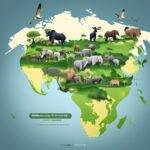The Southwest Wildlife Conservation Center (SWCC) is raising concerns over the increasing number of coyotes falling victim to poisoning in the Phoenix area, specifically in Sun City and Surprise. The alarming situation is attributed to the use of rodent poisons by homeowners.
Dr. Jaclyn Cubillas, a veterinarian with SWCC, highlights the distressing signs observed in affected coyotes, including abnormal pacing, disorientation, and changes in their gait. Neurological symptoms are particularly critical, requiring immediate rescue and intervention. The root cause, as explained by Dr. Cubillas, lies in the ingestion of rodenticides either by directly consuming the poison or through predation on rodents that have ingested it.
Impact on Wildlife Population
SWCC officials emphasize the severity of the issue, noting that numerous coyotes have been discovered dead or in near-death conditions. A distressing incident from Sun City involved a lifeless coyote found surrounded by its own excrement and vomit, highlighting the dire consequences of rodenticide toxicity. Dr. Cubillas stresses the broader impact on the wildlife population, stating that it extends beyond coyotes.
Lethal Effects on Predatory Species
The use of potent rodenticides poses a significant threat to predatory species like coyotes. Dr. Cubillas explains that newer rodenticides are formulated with highly potent chemicals, making a single ingestion by a rat lethal. This lethality is then amplified when a predator consumes the prey animal that has ingested the poison.
Young Mountain Lions at Risk
The repercussions are evident at SWCC, where two young mountain lions reside due to the loss of their mother to rodenticide poisoning when they were young. The vulnerability of these apex predators underscores the far-reaching consequences of indiscriminate rodenticide use.
Responsible Pest Control Measures
To mitigate the impact on wildlife, Dr. Cubillas recommends seeking alternative pest control methods from pest companies. Engaging in dialogue with pest control providers can help identify less harmful approaches, ensuring the well-being of both wildlife and the ecosystem.
Conclusion
The escalating threat of rodenticide poisoning among coyotes in the Phoenix area demands immediate attention and responsible action. By adopting alternative pest control methods and raising awareness about the lethal consequences, individuals can contribute to safeguarding the delicate balance of the local ecosystem. The preservation of wildlife requires a collective effort to address the root cause and implement sustainable solutions.









Leave a Reply